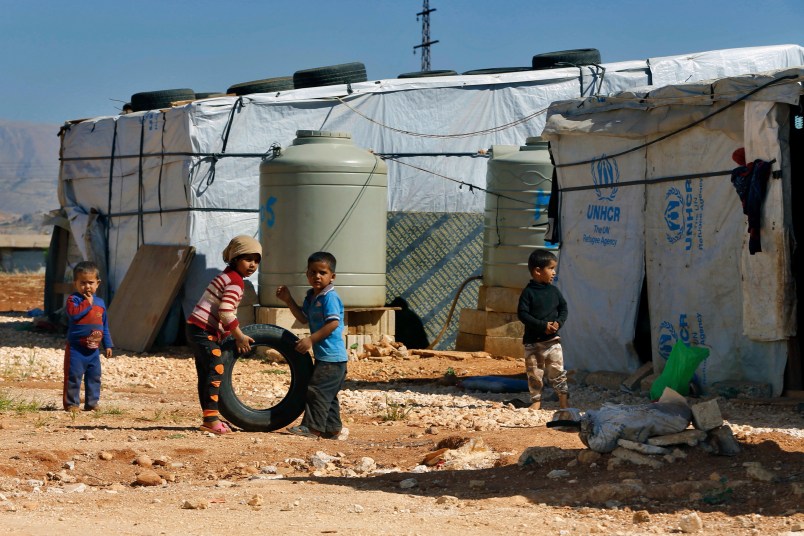BEIRUT (AP) — A Palestinian woman from Syria has become the first refugee living in a camp in Lebanon to test positive for the coronavirus, the U.N. agency for Palestinian refugees said Wednesday. It triggered a spate of testing to determine whether other residents have been infected.
The agency, UNRWA, said the woman resided in the only Palestinian camp in eastern Lebanon’s Bekaa region. It said all necessary measures had been taken and the patient was transferred to the government-run Rafik Hariri Hospital in Beirut.
Lebanon, a country of 5 million, hosts tens of thousands of Palestinian refugees and their descendants, most of them living in squalid camps that resemble jungles of concrete. The have no access to public services, limited employment opportunities and no rights to ownership. The country is also home to more than 1 million Syrian refugees and other Syrians who are residents.
The tiny country has recorded 22 deaths from among 682 confirmed cases of COVID-19, the illness caused by the virus. They include one Palestinian who lives outside a camp, and three Syrian residents who have tested positive.
Wednesday’s announcement was the first involving a refugee living inside one of the camps.
“There is always concern of an outbreak in a crowded place like the camps … but we hope that the measures we are taking with the ministry and others concerned will help us avoid an outbreak,” said Huda Samra, communications advisor for UNRWA in Lebanon. Up to 3,000 people live in the Wavel camp in the city of Baalbek, known locally as the Jalil, or Galilee camp.
Samra said a team comprising UNRWA members and Rafik Hariri hospital staff tested 146 people at the camp Wednesday, including all those who had contacts with the woman in recent days. She said the agency was committed to paying all testing and hospital expenses.
Lack of testing has stoked fears among millions of displaced people around the world packed into refugee camps and informal settlements. Wednesday’s announcement sparked concern in Lebanon, where human rights groups have long decried discriminatory measures against refugees.
Most people who become infected experience mild to moderate symptoms. But the virus can cause severe illness and lead to death, particularly among older people and those with underlying health problems. It is highly contagious and can be spread by those who appear healthy.
“The agency is doing everything necessary to provide the required assistance to the patient’s family to allow them to isolate themselves with all the arrangements required and to secure the necessary needs,” the UNRWA statement said Wednesday.
Lebanese Health Minister Hamad Hassan told reporters that two teams from the ministry headed on Wednesday morning to the Bekaa Valley, one to the Baalbek General Hospital and another to the Wavel camp where they will take test samples.
Refugee cases will be treated exactly like their Lebanese counterparts, the minister said, comments that were apparently in response to rights groups’ questions about Lebanon’s ability to provide refugees with health care.
Earlier this month, Human Rights Watch said at least 21 Lebanese municipalities introduced discriminatory restrictions on Syrian refugees that do not apply to Lebanese residents as part of efforts to combat COVID-19, undermining the country’s public health response.
The Baalbek region is one of the least infected districts in Lebanon, with less than five cases, according to government statistics.
Also on Wednesday, Iran reported 94 more deaths from the virus, with the death toll in the country now reaching 5,391, out of 85,996 confirmed cases. Iran is the hardest-hit country in the Mideast and one of the world’s worst outbreaks of the coronavirus.
In Saudi Arabia, the state-run news agency said King Salman is permitting the preachers at Islam’s holiest mosques in Mecca and Medina to perform nightly Ramadan prayers. However, worshippers from the public will not be permitted to attend due to restrictions aimed at limiting the spread of the virus.
The Kingdom announced earlier this week the continued suspension of prayers at mosques nationwide.
___
Associated Press writers Bassem Mroue in Beirut, Amir Vahdat in Tehran, Iran, and Aya Batrawy in Dubai, the United Arab Emirates, contributed to this report.







Sad to say but this is only the beginning. Refugee camps with poor medical services, rudimentary public health protocols, limited waste management…kind of like a petri dish for COVID-19.
These people are screwed. The West is in no mood to help and the rich Gulf princes idea of charity is paying millions to footballers in Europe. The Saudis just this week bought Newcastle United, and if history is any guide they would burn through billions, like Abu Dhabi’s princes did with Manchester City or Qatar’s with Paris Saint-Germain.
Those Persian Gulf royals are the world biggest parasites and should be given the Robespierre treatment, maybe they can use half-moon shaped blades in the guillotines.
Donnie: I don’t like losers who are refugees.
Sink them all.
“The first refugee living in a camp” but not the first recorded case globally.
The Lancet:
https://www.thelancet.com/journals/laninf/article/PIIS1473-3099(20)30200-0/fulltext